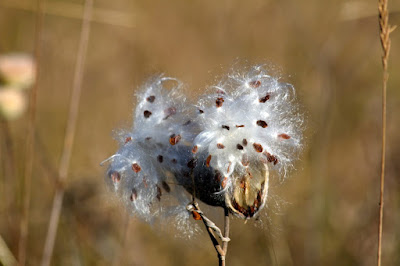I’m sitting in a chair watching, through the living room picture window, leaves travel sideways on the wind. Many leaves will be stripped from their branches before day is done. A few more days like today and most branches, except for oaks and evergreens, will be bare. It would be a classic understatement to note that the wind direction is highly variable, thereby complicating (preventing) using the electric leaf blower and a prevailing wind to clear much of the leaf litter. Ah, well! Tomorrow’s another day and today’s wind should do a great job of spreading milkweed seeds for next year’s plants.
 |
| split milkweed seed pod
Photo by J. Harrington
|
At least some sandhill cranes are still in the neighborhood. We saw a pair this morning as we headed to the Granddaughter’s house. I try to make it a habit to read with her one morning a week. Some weeks she’s more tolerant than others of being read to instead of reading her own books at her own pace. Today we shared Dr. Seuss’ The Lorax. It was first published in 1971, the year before significant amendments to the Clean Water Act were passed. In 1969, the Cuyahoga River had caught fire (again). In 1970, a Republican president created the Environmental Protection Agency. Reading The Lorax this morning to a two year old made me frustrated and angry that we as a society have clearly failed our descendants.
We have created the form, but not the substance, of environmental protection. Take a look at climate breakdown, the sixth extinction, and our continuing failures to respond to them in an effective way. The proverbial “younger generation” recognizes our false fronts. Here’s a recent instance:
“We are currently on track to have a world that is 3.2C hotter by the end of the century – and that’s if countries fulfil all the policies they have in place, policies that are often based on flawed and under-reported numbers. But in many cases they are nowhere near doing even that. We are “seemingly light years away from reaching our climate action targets”, to quote UN secretary general António Guterres in the autumn of 2021. And there is also the matter of our previous track record of failure when it comes to delivering on all those non-binding pledges and promises. Let’s just say it is not so impressive or convincing.”
Do you have, or hope to have, children or grandchildren? Have you given any thought to the kind of planet they’ll be forced to live on? Please think about the kind of life you want your descendants to be able to enjoy before you fill in the ovals on your ballot this year. They’ll thank us if we finally stand our ground or curse us if we fail them.
Characteristics of Life
Camille T. Dungy - 1972-
A fifth of animals without backbones could be at risk of extinction, say scientists.
—BBC Nature NewsAsk me if I speak for the snail and I will tell you
I speak for the snail.
speak of underneathedness
and the welcome of mosses,
of life that springs up,
little lives that pull back and wait for a moment.
I speak for the damselfly, water skeet, mollusk,
the caterpillar, the beetle, the spider, the ant.
I speak
from the time before spinelessness was frowned upon.
Ask me if I speak for the moon jelly. I will tell you
one thing today and another tomorrow
and I will be as consistent as anything alive
on this earth.
I move as the currents move, with the breezes.
What part of your nature drives you? You, in your cubicle
ought to understand me. I filter and filter and filter all day.
Ask me if I speak for the nautilus and I will be silent
as the nautilus shell on a shelf. I can be beautiful
and useless if that's all you know to ask of me.
Ask me what I know of longing and I will speak of distances
between meadows of night-blooming flowers.
I will speak
the impossible hope of the firefly.
You with the candle
burning and only one chair at your table must understand
such wordless desire.
To say it is mindless is missing the point.
********************************************
Thanks for visiting. Come again when you can.
Please be kind to each other while you can.
No comments:
Post a Comment